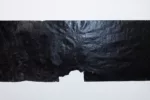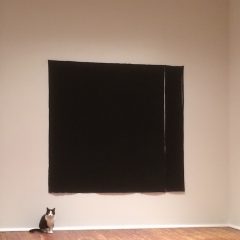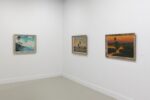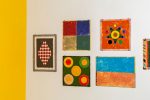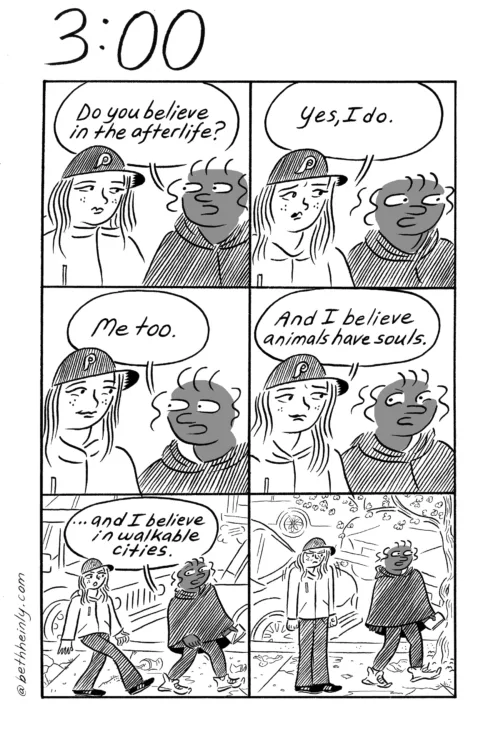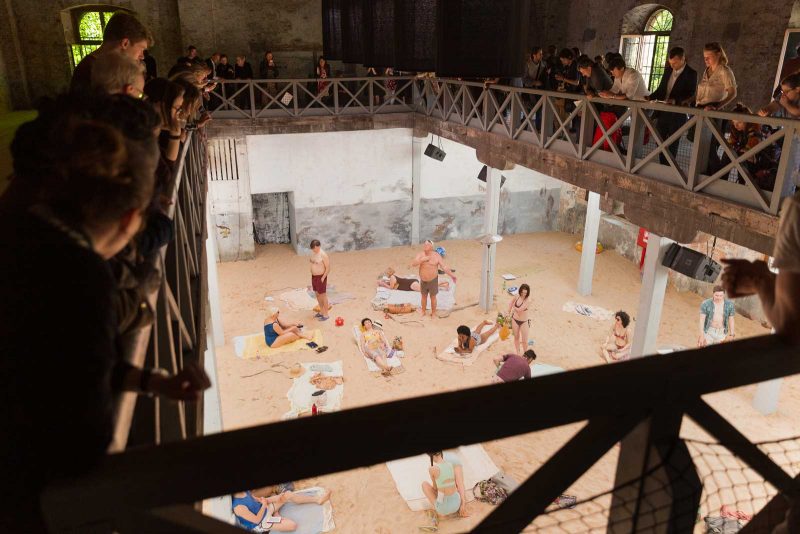
Sun & Sea, billed as an opera, was an extraordinary experience entirely of its own genre: a day at the beach that was simultaneously a dirge for the planet. We entered the huge, industrial space of The Budd in Nicetown, climbed a flight of stairs on scaffolding and found ourselves on a gallery surrounding a beach. The audience stood for the performance and could move about at slightly higher than a life-guard’s seat but much lower than a bird’s-eye view. The sand was filled with sunbathing tourists who were much too varied in age, shape and dress for an air-brushed travel brochure; they looked much like a scene photographed by Martin Parr: a well-fed woman beyond middle age in a fancy swimsuit, her husband on the towel next to her, applying sunscreen, well-scrubbed children, two adolescent girls who were identical twins and several women in bikinis, working on their tans.
The beachgoers were engaged in the usual, seaside activities: reading fiction and graphic novels, snacking, playing badminton, listening to music, and involved with various activities on their cellphones. Two dogs were part of the crowd: one patiently allowed himself to be dressed in a hat and sunglasses for a photograph while the other made the rounds with his owner who visited with other tourists reclining on lounge chairs, blankets and towels. Children played and built sandcastles, adults slathered themselves with sunscreen and one portly man stood to acquire an even suntan.
The games and chattering continued as the singing began, initially an aria which came from an unidentified soloist, as recorded music created ambient accompaniment. Identifying each singer became part of the audience’s job, since all performed as both chorus and soloists in turn, and no one stood to perform or was picked out by stage lighting. They sang from their recumbent, beachside positions – primarily on their backs. The music was minimalist in nature, with no crescendos or other musical devices to lend drama to the songs, which the audience could follow from librettos that had been handed out as programs.
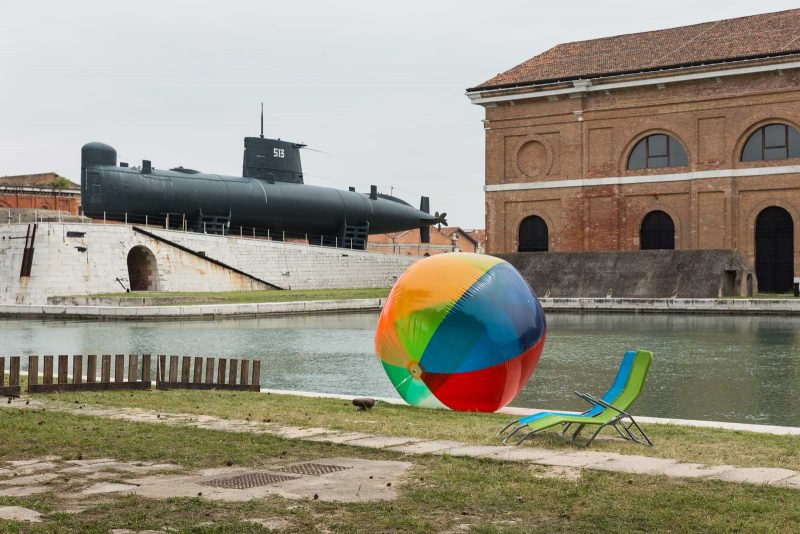
The soloists all spoke to themselves — arias of memory or reverie. The hour-long work was repeated over a period of hours and the audience could enter at any point, since the vocalists did not address each other and there was no narrative flow. The singer on a lounge chair sang the “Wealthy Mommy’s Song,” a list of seas and oceans her eight and a half year old son had already visited – she planned to show him oceans this year – and memories of a previous vacation with her husband, ending “What a relief that the Great Barrier Reef has a restaurant and hotel!”
A Philosopher comments on the ancient civilizations of Persia, India and China as reflected in the crowd on the beach: people eating dates from Iran, playing chess “invented by Indian Brahmins, wearing swimming suits made in the factories of China…,” his final line: “Is this not a parody of the Silk Road?” A Siren refers to humans as “This mammal with limited lung power [who] still tries so hard to go into the sea, to dive down deep: he wants to conquer and control what is not his to own… acidy waves, ivory foam, rocking the boats full of canned goods, tourists, fruit and weapons.”
A sunbather sings a “Song of Complaint,” noting the unpredictability of the weather: “The beginning of May brought us frost and snow… You see, we had Christmas at our farmhouse, but this year, there was no frost, no snow, it felt like it could be Easter!” which is followed by a “Chanson of Admiration,” ”Jellyfish dance along in pairs – with emerald-colored bags, bottles and red bottle-caps. O the sea never had so much color!”
Looking more closely at the scene below we see attempts to control nature and suggestions of failure. There are several tall heaters of the sort used to create sidewalk dining in cold weather; this is not a tropical climate, but one artificially heated by fossil fuel. A beachball is printed as a globe and beside it a large, toy cruise ship is sinking in the sand, and one of the graphic novels is titled “Raid of No Return.” Pieces of wood lie about, two of which resemble dead trees, and beside them is a bone so large it might be from an extinct, giant beast.
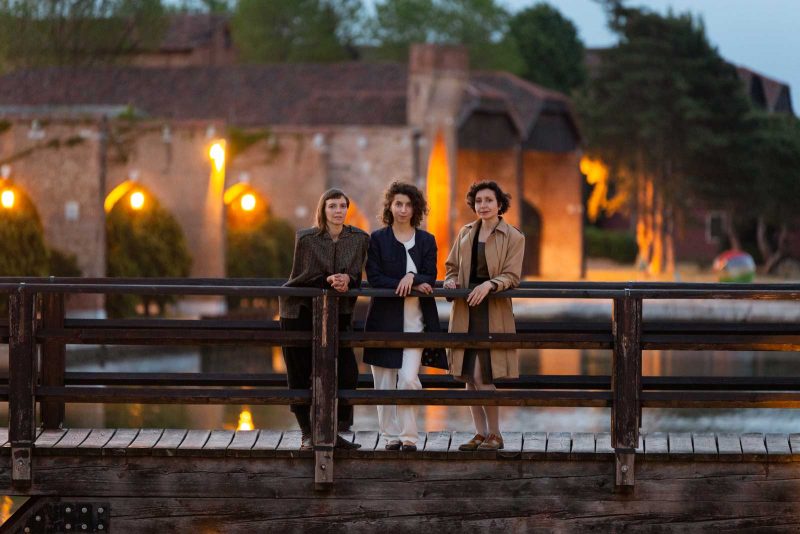
Someone sings of a volcano which erupted, despite the prediction of the climatologists, spoiling his past vacation. The airport was caught up in a black cloud of ashes, and the chorus intones “ASHES, AEROPLANES, ASHES, AEROPLANES, ASHES, AEROPLANES…” Later they sing “THIS YEAR THE SEA IS AS GREEN AS A FOREST: EUTROPHICATION! … OUR BODIES ARE COVERED WITH A SLIPPERY GREEN FLEECE, OUR SWIMSUITS ARE FILLING WITH ALGAE,…” Meanwhile, we can smell the sunscreen used by the oblivious tourists below.
“Sea and Sun” suggests not only that global tourism is ruining many of the landscapes that attracted the tourists, but that the escapism of tourism models our attitude to the earth: we do our best to mold nature to our desires and ignore the obvious signs of grave damage done already. We are only concerned with having enough clean towels, our preferred food to eat, the right stories to tell our friends, and an airplane ready to take us home on time.
The production was a collaboration by Rugilė Barzdžiukaitė, Vaiva Grainytė, and Lina Lapelytė; the Lithuanian director, librettist and composer had worked together previously. After its premiere in Lithuania the libretto was translated into English for an international tour. It won the Golden Lion award at the 2019 Venice Biennale. The production was curated by Lucia Pietroiusti and presented by Arcadia University in collaboration with the Philadelphia Fringe Festival. Philadelphia was extraordinarily fortunate to host this major production. It included humor and spectacle as well as artistry and a clear-eyed view of the environmental problems we have created and must face on a global scale.
“Sun & Sea” was presented September 30-October 3, 2021, by Exhibitions at Arcadia University as a selection in the 2021 Fringe Festival.



